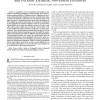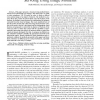114
click to vote
TROB
2010
14 years 8 months ago
2010
This paper deals with the image-based visual servoing (IBVS), subject to constraints. Robot workspace limitations, visibility constraints, and actuators limitations are addressed. ...
TROB
2010
14 years 8 months ago
2010
A new approach to a variable stiffness actuator with tunable resonant frequencies is presented in this paper. Variable stiffness actuators have become increasingly important for m...
98
Voted
TROB
2010
14 years 8 months ago
2010
131
click to vote
TROB
2010
14 years 8 months ago
2010
The property of form-closure of a grasp, as generally defined in the literature, is based on the assumption that contact points between the hand and the object are fixed in space. ...
138
click to vote
TROB
2010
14 years 8 months ago
2010
The manipulation of fast moving, delicate tissues in beating heart procedures presents a considerable challenge to the surgeon. A robotic force tracking system can assist the surge...
159
click to vote
TROB
2010
14 years 8 months ago
2010
The robot hand applying force on a deformable object will result in a changing wrench space due to the varying shape and normal of the contact area. Design and analysis of a manipu...
116
click to vote
TROB
2010
14 years 8 months ago
2010
Continuum robots, which are composed of multiple concentric, precurved elastic tubes, can provide dexterity at diameters equivalent to standard surgical needles. Recent mechanicsba...
146
click to vote
TROB
2010
14 years 8 months ago
2010
Abstract--Acquisition of new sensorimotor knowledge by imitation is a promising paradigm for robot learning. To be effective, action learning should not be limited to direct replic...
127
click to vote
TROB
2010
14 years 8 months ago
2010
This paper presents a visual-servoing method that is based on 2-D ultrasound (US) images. The main goal is to guide a robot actuating a 2-D US probe in order to reach a desired cro...
115
click to vote
TROB
2010
14 years 8 months ago
2010
Abstract--This paper proposes a unified optimization framework to solve the time parameterization problem of humanoid robot paths. Even though the time parameterization problem is ...


